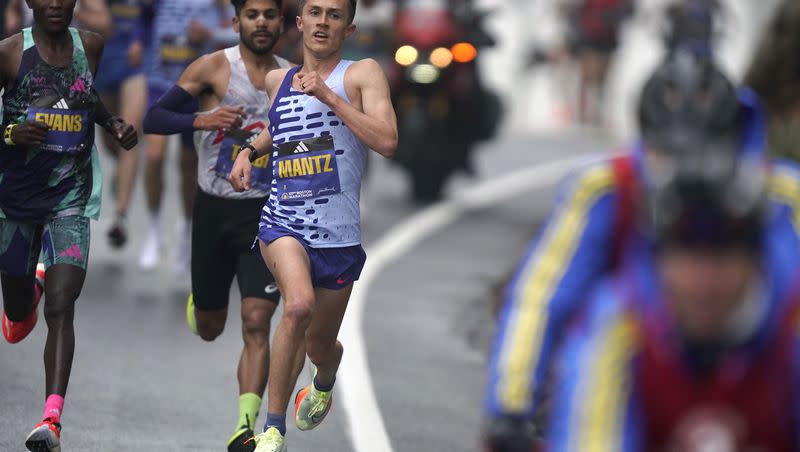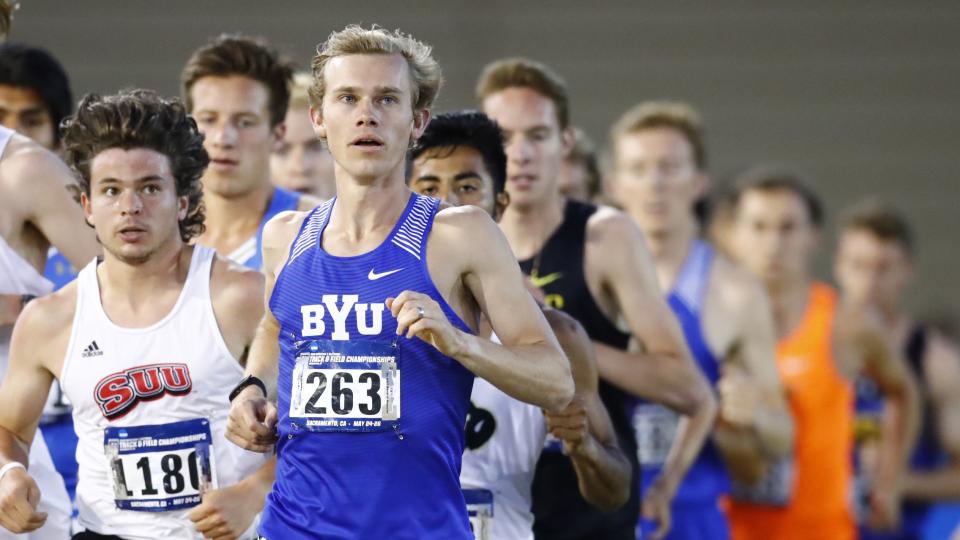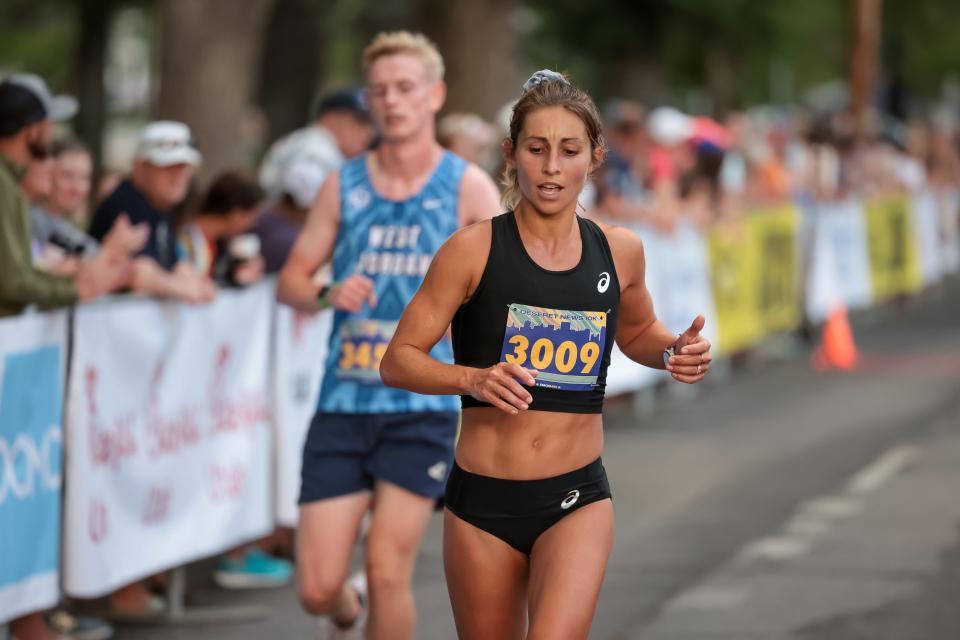Conner Mantz and Clayton Young expected to be in the mix for Olympic berths Saturday

- Oops!Something went wrong.Please try again later.
- Oops!Something went wrong.Please try again later.
Based on their performances in last fall’s blistering-fast Chicago Marathon, Conner Mantz and Clayton Young are the favorites heading into the U.S. Olympic Marathon Trials Saturday in Orlando.
In Chicago, Mantz and Young, former NCAA champions at BYU, were the top American finishers (sixth and seventh overall) and clocked the fourth- and seventh-fastest times ever by Americans. So they are the obvious pre-race choices to finish among the top three, which would send them to the Paris Olympics this summer.
“I’m going to compete to win — but I also understand that if it doesn’t happen I need to keep things in perspective. … It’s a lot of pressure, but also an exciting time. You never know what’s going to happen.”— Conner Mantz on this week’s Olympic Marathon Trials
On the other hand, the Olympic trials present a completely different challenge than the Chicago Marathon, even if they are the same 26.2-mile distance. Chicago was largely a time trial. Pacers were hired to pace various groups of runners and provided an even, energy-saving pace for the field to follow. Everyone knew the tactics beforehand.
They were racing against the clock more than racing each other, and it produced world records and countless personal records among the elite runners. The Olympic trials, like all championship races (NCAA championships, Olympics, Worlds) present a different type of challenge, with runners employing different tactics to try to shake the competition.
“There will be no pacers running nice, even splits,” says BYU coach Ed Eyestone, who trains Mantz and Young. “You’re looking at each other right from the gun and deciding how to respond — ‘Do I need to match this early surge or stay back with the pack and let (the frontrunners) dwindle (fall off the pace)?’ — and so forth. If they were running for time, there are not going to be three guys faster than Conner and Clayton. But with a championship-style race, you’re racing people, not the clock. And there’s the added pressure that this race happens only every four years.”
An Olympic berth of course is the goal of every runner, and there’s only a narrow window to secure one. Not only do marathoners have to produce on a given day every four years and finish in the top three in an event that is famously fraught with peril, they have to meet another criterion: a fast qualifying time. Fast times don’t often come in championship races for all the reasons identified above so usually marathoners have to produce them in another race, and there are only so many marathons a body can handle in a year.
Bonus bucks
Something more tangible than Olympic glory is also on the line Saturday — $600,000 in total prize money, including $80,000 to the winners of the men’s and women’s races. Second place is worth $65,000 and third $55,000.
The qualifying procedures for the Olympics are ridiculously complicated, but simply put, this is the current situation: Because Mantz and Young ran so fast in Chicago (well under the stiff Olympic standard), it guarantees that at least two Americans will qualify for the Olympics. In essence, other athletes can claim the BYU duo’s Chicago times for themselves if they finish among the top three). Weird. We won’t know until the end of April if there is a third American qualifier; he must be ranked in the top 80 in the world at that point. Each nation is limited to a maximum of three qualifiers.
Did you follow all that?
Things would be much simpler if Mantz and Young — with their automatic qualifying times — finish in the top three.
Race planning
Eyestone has coached both runners since they came to BYU. Both are Utah natives — Young is from American Fork, Mantz from Smithfield. At BYU, Young won the 10,000-meter run in the 2019 NCAA track championships and Mantz won two NCAA cross-country championships in 2020 and 2021. This week, Eyestone met with Mantz and Young in his BYU office several times to review their race plans down to the finest details, as much as that is possible — where they will take water on the course, when they will take caffeinated water on the course, how they will respond if Runner X surges or hangs back, etc.
Related
“They’re the two best guys in the country, and I hope they are able to demonstrate that Saturday,” says Eyestone. “Now we’re just hoping everything falls into place — that they navigate all the things that can adversely affect them during the race. Now it’s how their bodies respond, do they run smart and respond correctly to the strategies that other racers might throw at them. ... There are a thousand things that can go wrong.”
Eyestone knows. In the 1988 Olympic trials, he and Mark Conover were well out in front of the field for the last seven miles. Eyestone, with his track background, was confident that he could outkick Conover, but then he experienced a stabbing pain in his hamstring and worried that he might not be able to finish if he pushed it, costing himself a spot on the Olympic team. He backed off the pace and let Conover go. He eased home in second place.
‘A wild ride’
Mantz and Young have been grinding out grueling workouts to prepare for Saturday’s race. One of their recent workouts: 4x3-mile repeats, with a five-minute rest between reps, run at 4:40-4:45 per-mile pace. Another recent workout: a 25-mile run, covering the last four miles in 4:42, 4:43, 4:42, 4:32.
“Their buildup for this race has been even better than the buildup to Chicago,” says Eyestone. Independent of each other, Mantz and Young say the same thing, but Mantz notes, “It hasn’t been perfect.”
Mantz had COVID-19 at the end of October and early November. Then he had a stress reaction in his leg at the end of November into early December and had to train in a pool. Then he was sick again for three weeks at the end of September through mid-January. He trained through much of it.
“This is definitely the highest-profile race and the highest expectations I’ve ever had, being the No. 2 seed. If I can replicate Chicago, I’ll have a fantastic shot (at an Olympic berth). We modeled our training block after Chicago’s training block, and it’s been just as good or better. Things are turning in the right direction.” — Clayton Young on this week’s Olympic Marathon Trials
“It’s been a wild ride,” he says. “I haven’t been 100%. … But I think I’m in better shape from what I can tell. My (training) times have been better than for Chicago. It’s been really good recently, the last two months. I’m pretty confident I’ll make this team — I’m going to compete to win — but I also understand that if it doesn’t happen I need to keep things in perspective. … It’s a lot of pressure, but also an exciting time. You never know what’s going to happen.”
Two former BYU athletes have represented the U.S. in the Olympic marathon — Eyestone in both 1988 and 1992 and Jared Ward in 2016. Ward placed sixth and Eyestone placed 29th and 13th.
“This is definitely the highest-profile race and the highest expectations I’ve ever had, being the No. 2 seed,” says Young. “If I can replicate Chicago, I’ll have a fantastic shot (at an Olympic berth). We modeled our training block after Chicago’s training block, and it’s been just as good or better. Things are turning in the right direction.”
Mantz and Young are among the 22 athletes with Utah connections who qualified for Saturday’s Olympic Marathon Trials, although some have decided not to compete.

Utah ties
Athletes with Utah connections who have qualified for the U.S. Olympic Marathon Trials, which will be held Saturday in Orlando:
Men
Conner Mantz (BYU, Smithfield, 2:07:47): The former two-time NCAA cross-country champion owns the fastest time in the nation and the fourth fastest ever produced by an American. He’s the pre-race favorite, even with 2016 bronze medalist Galen Rupp in the field.
Clayton Young (BYU, American Fork, 2:08:00): The former NCAA 10,000-meter champion is another pre-race favorite, with the second fastest time in the field.
Nico Montañez (BYU, 2:09:55): Montañez has the 12th-fastest time among Americans this year. Last year he placed 13th in the 2023 Boston Marathon and 54th in the world championships. He was 20th in the 2020 Olympic trials.
Jared Ward (BYU, Kaysville, 2:11:44): At 35, Ward qualified for Saturday’s trials, but, according to Eyestone, he has decided to withdraw because of a chronic hamstring issue. He has had a tremendous pro running career, placing sixth in the 2016 Rio Olympics, running a personal record of 2:09:25 in the 2019 Boston race and collecting eight top-10 finishes in major marathons.
Christian Allen (Weber State/BYU, West Jordan, 2:15:01): Allen also has decided not to run Saturday, according to Eyestone. That’s understandable. Just two weeks ago, Allen placed sixth in the U.S. Cross-Country Championships to win a spot on the USA world championships team. Eyestone calls Allen “a legendary figure” on the trail-running circuit, “He’ll be very good at the marathon some day,” says the coach.
Connor Weaver (BYU/Utah State, 2:15:46): For Weaver, who was a member of BYU’s 2019 NCAA cross-country championship team, this will be only his second marathon.
Habtamu Cheney (Utah Valley, 2:16:12): Since finishing his collegiate eligibility at UVU, Cheney has turned to the road-racing scene. He debuted in the marathon last fall.
Jacob Heslington (BYU, Orem, 2:17:42): According to World Athletics, Heslington has run only one marathon — a 24th-place finish in last summer’s Grandma’s Marathon.
Kevin Lynch (Utah Valley, Sandy, 2:12:49): Lynch placed ninth in last year’s Grandma’s race in what is believed to be his debut at the 26.2-mile distance.
Patrick Smyth (Salt Lake City, 2:14:49): Now 37, he came out of retirement last year and set a personal record in the marathon. He was a seven-time All-American at Notre Dame and three-time conference champion as well as the school record-holder at 10,000 meters.
Jerrell Mock (Logan, 2:14:10): A former Colorado State runner, he owns a personal record of 2:10:37 from 2019.
Travis Morrison (South Salt Lake, 2:15:55): Morrison competed for Division III North Central College in his native Illinois. The 31-year-old also qualified for the 2020 marathon trials.
Sean O’Connor (Salt Lake City, 2:17:08): He competed for D-III Rensselaer Polytechnic Institute in his native New York. He was the youngest qualifier (22) at the 2020 marathon trials.
Riley Cook (Weber State, Ogden, 2:17:23): Cook ran his qualifying time and personal record at the age of 401⁄2 in December 2022 in Sacramento.
Women
Sarah Sellers (Ogden, Weber State, 2:25:43): Sellers gained international fame with her shocking, out-of-nowhere, second-place finish in the 2018 Boston Marathon. She has given birth to two children since then. A few months after the arrival of her first baby, she ran a personal-record time of 2:25:43, making her the 14th-fastest entry in Saturday’s race. She hasn’t raced since giving birth to her second child last spring (although she paced her husband’s marathon debut in St. George last October). She was 10th in the 2020 Olympic marathon trials.
Makenna Myler (BYU, Highland, 2:31:59): She gained her own measure of fame by running a mile in 5 minutes, 25 seconds a couple of weeks before giving birth, at least partly to settle a bet with her husband, who posted a popular video of her performance online. About seven months later, she finished 14th in the 10,000-meter run at the 2020 U.S. Track and Field Trials. She completed the Houston Half-Marathon in 1:08:28 two weeks ago.
Grayson Murphy (University of Utah, Salt Lake City): Murphy, who qualified for Saturday’s race with a half-marathon time (1:10:34), shows up everywhere, excelling in races on the track, on the road, on the mountain and on the trail. This will be her marathon debut, but she figures to be formidable at that distance. She won world mountain running championships in 2019 and 2023 and placed sixth in the steeplechase at the U.S. Olympic track and field trials.
Savannah Berry (Utah Valley, 2:29:13): Since finishing her eligibility at UVU, Berry has run three marathons and improved dramatically each time, from 2:50 to 2:38 to 2:29.
Tori Parkinson (Utah State, Wellsville, 2:32:35): A steeplechaser who completed her collegiate eligibility in 2017, Parkinson made her marathon debut last June.
Billie Hatch (Weber State, 2:35:47): The 2023 Big Sky Conference indoor 5,000-meter champion made a quick move to the roads and produced a qualifying mark in the marathon in Chicago last fall.
Sylvia Bedford (Southern Utah, Fairview, 2:36:34): In her third marathon attempt last summer she qualified for the trials with a personal-best performance. Like Berry, Heslington and Weaver, she is coached by Salt Lake Community College head coach Isaac Wood.
Natalie Callister (Weber State, Kaysville, 2:36:46): More than a decade after running for Weber State, Callister (nee: Haws) ran her marathon PR last fall. Sellers is her sister-in-law.


